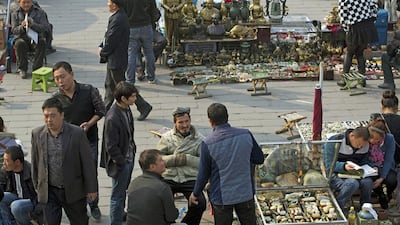BEIJING // In a dusty outdoor antiques market in China’s capital, traders from the minority Uighur community gathered yesterday to swap stories about the harassment they say they suffer at the hands of the police. That scrutiny has only intensified after this week’s deadly vehicle attack at Tiananmen Square in which the Uighurs are the prime suspects.
Before the day ended, five of the suspects had been arrested on suspicion of involvement in Monday’s attack, which police described as carefully planned terrorism. Police also said knives, iron rods, gasoline and a flag with religious slogans were found in the vehicle used in the suicide attack.
“They [police] come to search us every day. We don’t know why. Our IDs are checked every day, and we don’t know what is happening,” said Ali Rozi, 28, a Uighur trader at the Panijayuan market.
“We have trouble every day, but we haven’t done anything,” said Mr Rozi, who is from Kashghar, the capital of Xinjiang province where most Uighurs live.
Militants from the Muslim Uighur community have been fighting a low-intensity insurgency against Chinese rule in Xinjiang, for years. Recent clashes, including an attack on a police station, have left at least 56 people dead this year. The government typically calls the incidents terrorist attacks.
The police scrutiny of the Uighurs in Beijing highlights the years of discrimination that have fuelled Uighur demands for independence for their northwestern homeland of Xinjiang. Many Uighurs say they face routine discrimination, restrictions on their culture and religion, and economic disenfranchisement that has left them largely poor even as China’s economy booms.
In Monday’s incident, a sports utility vehicle barrelled through crowds and burst into flames near the portrait of Mao Zedong on Tiananmen Gate. Three of the car’s occupants and two bystanders were killed, and dozens injured.
A list of as many as 10 suspects – all but one of them believed to be Uighur – was distributed to hotels in a bid for information.
If the Tiananmen Square incident proved to be carried out by Uighurs, it would be the first such attack outside the region in recent history, and among the most ambitious given the high-profile target.
“I am also upset. They crashed a car, and we end up being harassed by police every day now, saying that we Xinjiang people are like that,” said Rozi Ura Imu, a 48-year-old trader in jade and other precious stones from the ancient Silk Road city of Kashghar.
The Panijayuan market has thousands of stalls featuring crafts from regions throughout China: rows of statues and furniture, bins of beads and trinkets, cases of books and scrolls.
Uighurs are a Turkic Central Asian people related to Uzbeks, Khazaks and other groups. With their slightly European features and heavy accents, most are immediately recognisable as distinct from China’s ethnic Han majority.
Recent moves to mainly use Chinese in Xinjiang schools have raised fears of the further erosion of Uighur language and culture, as well as job losses for Uighur teachers.
Uighurs also say they’ve seen little benefit from the exploitation of Xinjiang’s natural resources while good jobs tend to flow to migrants from China’s ethnic Han majority.
Uighurs frequently say they’re made to feel like second-class citizens, facing difficulties obtaining passports or even travelling outside Xinjiang. Hotels and airlines are reported to have floating unofficial bans on catering to Uighurs, and many employers refuse to hire them.
“Hotels won’t take us and you can’t rent if your ID shows a Xinjiang residence. People look at us with a lot of prejudice,” said Yusuf Mahmati, 33, a fur trader plying his wares on a busy sidewalk opposite the Panijayuan market, a gathering place for traders from several regional ethnic groups.
Uighur activists say they fear Uighurs could face even more discrimination following this week’s attack and urged the government to conduct a transparent investigation.
The overseas advocacy group World Uyghur Congress on Tuesday urged caution and expressed concerns that Beijing could use the incident to demonise Uighurs as a group.
Beijing-based Uighur economist Ilham Tohti urged the government to make public its findings if it indeed has evidence that Uighurs were involved in a terrorist attack.
“I wish they will promptly announce the identities of the deceased, and all relevant information. If the government has concluded this is a terrorist attack, then please tell us what is the plot behind it,” Mr Tohti said.
Mr Tohti has been placed under house arrest numerous times after deadly ethnic rioting in Xinjiang’s capital, Urumqi, in 2009 that sparked a nationwide crackdown on Uighur activists. The Urumqi violence killed nearly 200 people, most of them Han.
Xinjiang borders Afghanistan and Central Asian states with militant Islamist groups, and Uighurs are believed to be among militants sheltering in Pakistan’s north-western region.
*Associated Press

